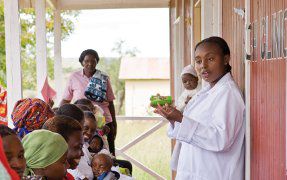Bayer Launches New Sustainability Program
The world is facing a number of major challenges: One of the most important is the growth of the global population and the factors associated with this, such as access to healthcare, regular food supplies, and effective environmental and climate protection. These global problems are the main starting point for the new Bayer Sustainability Program.
Bayer can look back on a long and successful tradition of sustainable business management. In 2009 we transferred our existing activities along with new approaches into an integrated strategy. Global challenges that have a major impact on our key areas of activity formed the starting point. The following core material sustainability issues were identified:
- Alliances for sustainable healthcare
- Partnerships for more high-quality food
- Solutions for climate protection and resource use
Our intention is to demonstrate the purpose of our sustainability activities – creating benefits for both business and sustainability. For Bayer, as an inventor company, this means finding innovative strategies, products, and solutions to deal with the pressing issues of the future. Bayer will therefore align its core businesses more rigorously than before to sustainability criteria – an objective that is reflected in our mission statement “Bayer: Science for a Better Life.” We want to position our products and expertise precisely where they generate the biggest effect. We will focus in particular on innovations – which for us are the driving forces for sustainability – and strategic partnerships.
We devised eight lighthouse projects for the key material issues identified, featuring our products and the expertise of our employees. These projects were selected based on their relevance – for our business and for our stakeholders.
1. Self-determined family planning and combating neglected diseases

Photo: Bayer HealthCare
Improving maternal health and reducing child mortality, especially in the emerging and developing countries, are two of the eight UN Millennium Development Goals. Pursuing these objectives is becoming increasingly urgent due to the rising world population. Our “Family planning” lighthouse project aims to make an important contribution to enabling self-determined family planning throughout the world. Together with public institutions and nongovernmental organizations, we are initiating projects to foster awareness and education in the field of contraception and improve access to modern contraceptive methods. Bayer will double these activities by 2012, and, with partners such as USAID (United States Agency for International Development), will provide oral contraceptives for approximately eight million women annually.
In another lighthouse project, Bayer will be intensively involved in the fight against “neglected diseases.” Over 3.3 billion people – mostly the poorest of the poor – are affected by these. In cooperation agreements with the World Health Organization, Bayer will provide free drugs to tackle – among other illnesses – Chagas’ disease and African sleeping sickness. In addition, together with the Global Alliance for TB Drug Development (TB Alliance), we are developing an improved treatment of tuberculosis.
2. High-quality food in emerging countries: India and Indonesia as examples

Photo: Bayer CropScience
According to studies carried out by the UN, the world population will grow by around three billion people by 2050. To safeguard adequate food supplies in the future, Bayer is promoting innovative concepts for sustainable agriculture. An important element of this commitment are the Food Chain Partnerships. The aim of these projects is to network the various players along the value chain – from the producer to the trade. We have selected one of these Food Chain Partnerships as a lighthouse project: To strengthen vegetable growing in India, we will help the participating farmers to comply with stringent local and international quality requirements and thus increase their chances of earning a reliable income. The objective is to include 65,000 small farmers in the program by 2011.
Improving the efficiency of rice-growing is the subject of another lighthouse project, in this case in Indonesia. A new method of rice cultivation – combined with an integrated package of seeds, crop protection products, and training – can increase harvest yields by around 10 percent and also improve sales and incomes for the farmers and their families. As an additional benefit, emissions of the climate-harmful gas methane in the rice fields can be reduced by around 30 percent.
3. Solutions for climate protection and resource use: The building sector and chemical production
Bayer’s Sustainability Strategy
- Bayer is committed to sustainable development: Economy, ecology, and social responsibility are corporate policy objectives of equal rank.
- Sustainability strategy frame: creation of additional value by integrating sustainability in core business
This shall be achieved in three areas:
- The products and innovations are the heart of Bayers business. Innovations are the drivers of sustainable development for mastering global challenges. The products and expertise make contributions to the key areas of healthcare, nutrition, climate protection, and resource efficiency. They are designed to benefit people and improve their quality of life (see Bayer Sustainability Program).
- The business practices and activities, that is, how we run our business. We want to act responsibly across the entire value-added chain – toward all our stakeholders, especially our employees, customers, suppliers, and stockholders.
- The social commitment: by becoming socially involved as a good corporate citizen.
Responsibility and Governance regarding sustainability are at the board level. Sustainability is an integral part of Bayers corporate strategies.
Energy consumption in buildings is responsible for nearly 20 percent of global greenhouse gas emissions. The EcoCom¬mercial Building initiative, launched at the end of 2007 as part of our Bayer Climate Program, has now been extended into the EcoCommercial Building program. At the heart of this lighthouse project is a partnership network that brings together suppliers, building companies, architects, and property developers. We contribute our expertise and high-tech products from MaterialScience and get partners involved to find tailor-made solutions for the construction of sustainable, energy-optimized commercial and public buildings – from low-energy housing and “passive houses” to zero-emission buildings. By marketing this concept externally, we can make an important contribution to climate protection in the building sector as a whole. Our high-quality materials for building insulation, lightweight construction materials, and water-borne coating materials fit in ideally with these growing markets.
One of the first showcases for this program was the company’s emissions-neutral kindergarten at our site in Monheim, Germany, which we opened in November 2009. A low-emissions company office building has been built in Belgium, and another one is under construction in India. These showcases reflect the ability of our concept to function in different climate zones and in various uses.
4. Energy efficiency in chlorine production
Through another lighthouse project, “Energy efficiency in chlorine production,” we are achieving a significant reduction in greenhouse gas emissions. The production of chlorine – a basic chemical in the manufacture of plastics and drugs among other products – is extremely energy-intensive. Back in 2008, Bayer succeeded, together with its partners, in developing an innovative, climate-friendly process for a new acid-based oxygen depolarized cathode technology. This integrates the principle of the fuel cell and reduces electricity consumption – and thus CO2 emissions – in chlorine production by 30 percent. In another cooperation project, a Bayer research team took this technology for chlorine production a step further – this time developing a process based on salt. The first industrial-scale plant to use this technology is scheduled to go on stream at one of Bayer’s German sites in 2011. Bayer will also offer this innovative technology to other chlorine producers around the world. The use of this technology opens up the potential for the international chlorine industry to cut annual greenhouse gas emissions by 5 million metric tons.
Solutions targeted at the more efficient utilization of resources are the subject of two other lighthouse projects in the Sustainability Program. The innovative energy-efficiency management system STRUCTese® aims to systematically utilize untapped energy-saving potential. It also ensures that the requisite technical measures and organizational processes are effectively integrated at Bayer MaterialScience.
The “resource efficiency check” sets out to ensure process-oriented optimization of the effective use of all resources. This tool is based on innova¬tive technologies for the reduction of energy, water, and feedstock consumption, and for cutting the amount of waste and emissions.
5. Measurable results
With these eight lighthouse projects, Bayer will be able to directly enhance the level of healthcare and improve the economic and social situation of more than 15 million people. Ecologically, too, our sustainability commitment will have measurable effects: We will raise the energy efficiency of our production facilities by 10 percent and, as a result, reduce annual greenhouse gas emissions by 350,000 metric tons by 2013. Furthermore, our new chlorine production technology will lower emissions by a further 250,000 metric tons by 2020.
The Bayer Sustainability Program will make a concrete contribution to the Global Compact Principles and the Millennium Development Goals of the United Nations – especially improving maternal health, reducing child mortality, empowering women, combating diseases, and eradicating hunger and poverty. Our program is designed to achieve sustainable success and generate first-class solutions. After all, sustainability is an integral part of our corporate policy.
Dr. Wolfgang Grosse Entrup is Head of Environment and Sustainability of Bayer AG. Since 2007, he is responsible for global management of group activities in these areas. He reports directly to the Group Management Board. Dr. Grosse Entrup is both Chairman of the German Federal Commission on Environmental Policy of the Economic Council and the board of management of the German econsense-Forum.
 About Bayer
About Bayer
Bayer is a global enterprise with core competencies in the fields of health care, nutrition and high-tech materials. The company’s products and services are designed to benefit people and improve their quality of life. At the same time Bayer creates value through innovation, growth and high earning power.
The Group is committed to the principles of sustainable development and to its role as a socially and ethically responsible corporate citizen. Economy, ecology and social responsibility are corporate policy objectives of equal rank.
About Us // Privacy Policy // Copyright Information // Legal Disclaimer // Contact
Copyright © 2012-2018 macondo publishing GmbH. All rights reserved.
The CSR Academy is an independent learning platform of the macondo publishing group.









